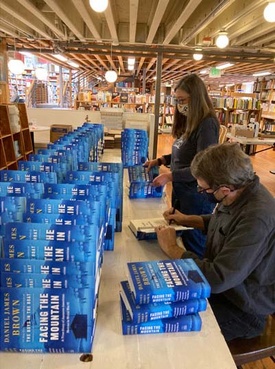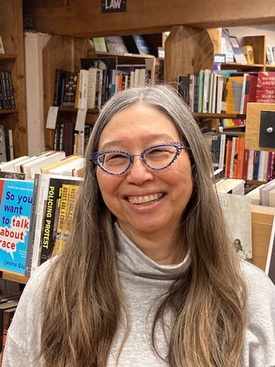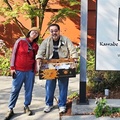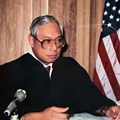Let’s talk about your literary life. Did you always have a keen appreciation for books growing up?
I actually started out as a psychiatric nurse and nurse educator for 20 years. Psychiatric nursing was something that interested me but I learned that nursing is quite conservative as a profession and if you are trying to study something that is unconventional, you will face challenges.
Both my parents were avid readers. My mom read books and magazines in Japanese and bought me copies of English translations of Japanese classics like The River Ki and The Makioka Sisters. My dad was always reading something and took me to the library every Saturday.
After moving to Seattle to attend graduate school, I joined the Red and Black Bookstore Collective as a volunteer. I was really trying hard to find a community where I fit in. It was a great place to learn more about political action and all these great books being published by women, gay and lesbian people, Black, Asian, Latina and Native American writers. There were only a few by multiracial writers and transgender writers (the latter are those whose identity and gender don’t correspond with their birth sex). We also specialized in what were then called “multicultural” children’s books; but after a while, fewer of these books were published.
Fast forward to today, we’re now enjoying another big wave of great books of all types by people from an even greater diversity of backgrounds. BIPOC (Black, Indigenous, People of Color), Asian and Pacific American, Arab American, immigrant writers, and writers of books translated from many different languages are all being published and read these days. And these days, people expect to see these books on bookstore shelves!
What have been some big highlights of your long career with Elliott Bay Books?
One event was the Seattle Public Library’s 2005 “Seattle Reads” author-event program which featured Julie Otsuka (When the Emperor Was Divine). The very full room at the Beacon Hill Branch in south Seattle included many who had been in the camps. Fumiko Hayashida, who is the mother carrying her infant in the iconic “poster photo” in 1942, sat in the front row that night. Some older non-Nikkei attendees who were children at the time, shared the shock and fear they felt as their Nikkei classmates disappeared. And they remembered their parents’ silence.
So often, people who don’t speak up at the microphone during an event will talk to us later and the stories come pouring out.
I’ve also sold books at the Day of Remembrance held each year in February commemorating the day that President Roosevelt signed Executive Order 9066 sending Japanese Americans to the camps.
One such memorable event was at the Seattle Center in 2018 with Gold Star Father Khizr Khan (An American Family) and Tom Ikeda, Executive Director of Densho, with the Washington chapter of the Council on American-Islamic Relations, Seattle Public Library, and Densho.
I looked around at the 1,500 people of all backgrounds and some were teachers, some came that day to protest the Muslim immigration ban and wanted to better understand what had happened during WWII. Others asked if I had books about specific incarceration camps, saying that their parents or grandparents had been incarcerated but would never talk to them about their experiences.
We’ve worked with many famous authors over the years, including Kazuo Ishiguro, who read from his novel, Buried Giant, shortly before he won the Nobel Prize for Literature.
In 2018, I was asked to serve on the Judging Panel for the National Book Award for Translated Literature. This was the first year for the Translated Literature prize and what a thrill it was to be part of that process. The finalists included Olga Tokarczuk, now a Nobel Prize Laureate. The winner, Yoko Tawada, who writes in both German and Japanese, had read at our bookstore years earlier as part of a program sponsored by the Japan Foundation.

Most recently, we’ve had some great Zoom events, including one produced this year with Daniel James Brown, author of Facing the Mountain, and moderated by Tom Ikeda. Daniel signed 300 books before the event and we have just a few left!
How have Japanese American and Asian American authors and books changed over the years?
Years ago, I used to personally buy every book I found by an Asian American author. Now, due to the tremendous volume of authors, I can’t buy them all and even if I could, I couldn’t read them all!
Right now we’re seeing more publishing by Korean American writers such as Grace M. Cho (Tastes Like War) and E.J. Koh (The Magical Language of Others) and high profile books by authors of Filipino, South Asian, Cambodian and Vietnamese descent, to name just a few. More LGBTQ (Lesbian, Gay, Bisexual, Transgender, Queer) authors of Asian and Asian American descent are being published, too. And finally, poetry books are unbelievably popular.
Can you name a few of your favorite Asian or Japanese American authors and titles? What are your favorite genres of books, and why?
I’ve mentioned Julie Otsuka, whose book, Buddha in the Attic, is a great novel about “picture brides.” She has a wonderful contemporary novel, The Swimmers, coming out in February 2022.
Shawn Wong’s new Asian American classic book series at University of Washington Press just republished two books by the late Janice Mirikitani, a poet and activist who was until recently one of very few Asian Americans publishing writing about surviving sexual violence.
I love to read translations, including The Memory Police by Yoko Ogawa and Books of Jacob by Olga Tokarczuk.
I probably enjoy memoirs most of all as I enjoy reading about people’s lives. One of my favorites was All You Can Ever Know, by writer/editor Nicole Chung, who was born in Seattle to Korean immigrant parents and adopted and raised by white parents in southern Oregon. She writes with such compassion about the very complicated lives of her birth parents and her adoptive parents. The emergence of more literature and film by adoptees, particularly international and transracially-adopted people, is both important and wonderful.
Are books accessible to marginalized communities, or for example, home-bound seniors who either don’t have mobility access or financial abilities to purchase books?
Books are not as available as they should be, in my opinion. Seattle Public Library is a great resource and has e-book and digital audio available, as well as large-print books.
The Washington Talking Book and Braille Library is another great resource, located in downtown Seattle. You can check it out.
Many bookstores, including ours, have low-cost, bargain book sections and also have book donation programs. We have some great used bookstores in our city, including Magus, Mercer Street Books and Third Place Books. I love the Little Free Libraries which people from all over the city have placed in their yards and passersby can either donate some good books or select a couple for free.
How can people begin to explore books either online or at your Seattle bookstore?
I don’t think anything comes close to the experience of visiting a bookstore in person. The serendipity of finding the exact thing you need or want to read right now, because you had a conversation with someone, saw a book cover, or read a review is not something that an online program can give you.
If you stop by Wing Luke Asian Museum’s gift shop in Seattle’s CID, for example, you might find a book about an Asian American kid working in her parents’ small town motel. At Kinokuniya bookstore (Seattle and Bellevue), you might find a little section of books in Japanese that are written by Seattle authors, with a handwritten sign about them. At Elliott Bay Bookstore, you might have attended a midnight book release party for a new Murakami novel or found that series of mystery novels starring a Kibei gardener in Los Angeles.
We can help you find that hard-to-find novel by that Black Japanese writer or the book by the photographer who took pictures of families returning to visit Minidoka. Or you can just browse our handwritten “staff recommends” cards, both in displays and in sections around our store, including in our Asian American Studies section.
My dad always used to say, “Books are friends.”
I think that he meant that we should treat books (and their writers and potential readers) with care, interest and respect. It is my hope that more people find and fall in love with books, or discover new titles that can enrich our lives.
* * * * *
Karen Maeda Allman has served as Author Events Bookseller at Elliott Bay Book Company for 22 years. She is estimated to have participated in 10,000 events spanning her incredible career. The daughter of a Japanese mother and white father, a former nurse and punk rocker, Karen has served on numerous book jury and award panels and has received various prestigious awards.
*This article was originally published in the North American Post on January 28, 2022.
© 2022 Elaine Ikoma Ko / The North American Post






